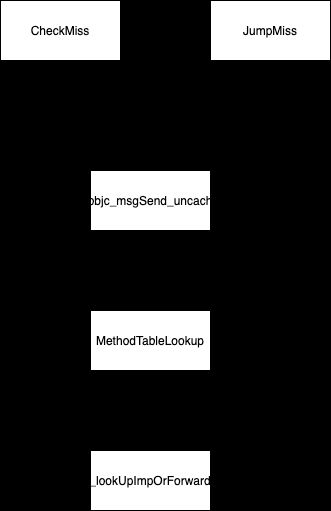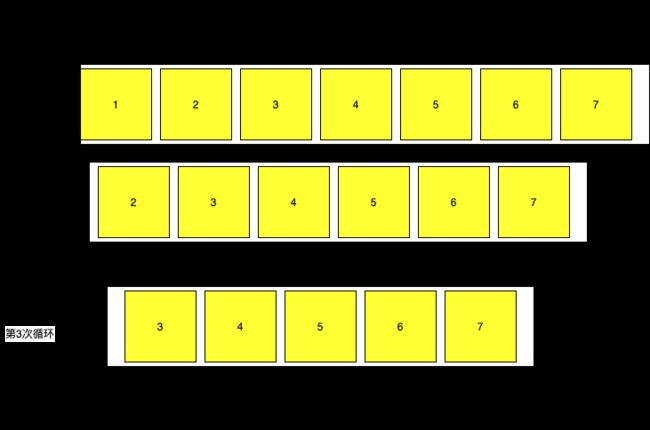前沿
在objc_msgSend缓存中读取IMP中,
如果缓存没有找到会有下面方法
.macro CheckMiss
// miss if bucket->sel == 0
.if $0 == GETIMP
cbz p9, LGetImpMiss
.elseif $0 == NORMAL
cbz p9, __objc_msgSend_uncached
.elseif $0 == LOOKUP
cbz p9, __objc_msgLookup_uncached
.else
.abort oops
.endif
.endmacro
.macro JumpMiss
.if $0 == GETIMP
b LGetImpMiss
.elseif $0 == NORMAL
b __objc_msgSend_uncached
.elseif $0 == LOOKUP
b __objc_msgLookup_uncached
.else
.abort oops
.endif
.endmacro
流程图如下
今天我们着重分析_lookUpImpOrForward
_lookUpImpOrForward
我们先用一个流程图来大致了解一下_lookUpImpOrForward的流程
我们先了解一下源码
IMP lookUpImpOrForward(id inst, SEL sel, Class cls, int behavior)
{
const IMP forward_imp = (IMP)_objc_msgForward_impcache;
IMP imp = nil;
Class curClass;
runtimeLock.assertUnlocked();
//如果是从快速查找中进来的不会走cache_getImp方法
// Optimistic cache lookup
if (fastpath(behavior & LOOKUP_CACHE)) {
imp = cache_getImp(cls, sel);
if (imp) goto done_nolock;
}
// runtimeLock is held during isRealized and isInitialized checking
// to prevent races against concurrent realization.
// runtimeLock is held during method search to make
// method-lookup + cache-fill atomic with respect to method addition.
// Otherwise, a category could be added but ignored indefinitely because
// the cache was re-filled with the old value after the cache flush on
// behalf of the category.
runtimeLock.lock();
// We don't want people to be able to craft a binary blob that looks like
// a class but really isn't one and do a CFI attack.
//
// To make these harder we want to make sure this is a class that was
// either built into the binary or legitimately registered through
// objc_duplicateClass, objc_initializeClassPair or objc_allocateClassPair.
//
// TODO: this check is quite costly during process startup.
checkIsKnownClass(cls);
if (slowpath(!cls->isRealized())) {
cls = realizeClassMaybeSwiftAndLeaveLocked(cls, runtimeLock);
// runtimeLock may have been dropped but is now locked again
}
if (slowpath((behavior & LOOKUP_INITIALIZE) && !cls->isInitialized())) {
cls = initializeAndLeaveLocked(cls, inst, runtimeLock);
// runtimeLock may have been dropped but is now locked again
// If sel == initialize, class_initialize will send +initialize and
// then the messenger will send +initialize again after this
// procedure finishes. Of course, if this is not being called
// from the messenger then it won't happen. 2778172
}
runtimeLock.assertLocked();
curClass = cls;
// The code used to lookpu the class's cache again right after
// we take the lock but for the vast majority of the cases
// evidence shows this is a miss most of the time, hence a time loss.
//
// The only codepath calling into this without having performed some
// kind of cache lookup is class_getInstanceMethod().
for (unsigned attempts = unreasonableClassCount();;) {
// curClass method list.
Method meth = getMethodNoSuper_nolock(curClass, sel);
if (meth) {
imp = meth->imp;
goto done;
}
if (slowpath((curClass = curClass->superclass) == nil)) {
// No implementation found, and method resolver didn't help.
// Use forwarding.
imp = forward_imp;
break;
}
// Halt if there is a cycle in the superclass chain.
if (slowpath(--attempts == 0)) {
_objc_fatal("Memory corruption in class list.");
}
// Superclass cache.
imp = cache_getImp(curClass, sel);
if (slowpath(imp == forward_imp)) {
// Found a forward:: entry in a superclass.
// Stop searching, but don't cache yet; call method
// resolver for this class first.
break;
}
if (fastpath(imp)) {
// Found the method in a superclass. Cache it in this class.
goto done;
}
}
// No implementation found. Try method resolver once.
if (slowpath(behavior & LOOKUP_RESOLVER)) {
behavior ^= LOOKUP_RESOLVER;
return resolveMethod_locked(inst, sel, cls, behavior);
}
done:
log_and_fill_cache(cls, imp, sel, inst, curClass);
runtimeLock.unlock();
done_nolock:
if (slowpath((behavior & LOOKUP_NIL) && imp == forward_imp)) {
return nil;
}
return imp;
}
cache_getImp
从缓存中查找本类方法
STATIC_ENTRY _cache_getImp
GetClassFromIsa_p16 p0
CacheLookup GETIMP, _cache_getImp
LGetImpMiss:
mov p0, #0
ret
END_ENTRY _cache_getImp
从汇编中看出,如果lookUpImpOrForward是从objc_msgsend流程的快速查找方法
进来的话第一个cache_getImp方法不会走,因为behavior的参数
CacheLookup后面参数为GETIMP,如果缓存中找不到接下来可能会走CheckMiss或者JumpMiss中的一个由于参数为GETIMP所以走LGetImpMiss,返回空,
是否已经实现realizeClassMaybeSwiftAndLeaveLocked如果没有实现下面步骤
realizeClassWithoutSwift中主要是给class赋值,把类中的元素添加进去。
supercls = realizeClassWithoutSwift(remapClass(cls->superclass), nil);
metacls = realizeClassWithoutSwift(remapClass(cls->ISA()), nil);
这两个方法实现递归,把所有的父类和元类的父类都递归完
isInitialized方法
类的方法列表中查询对应的方法
getMethodNoSuper_nolock中for循环
getMethodNoSuper_nolock中for循环又一个方法search_method_list_inline是采用二分法实现方法的寻找
** lookUpImpOrForward只是负责寻找IMP,那什么时候完成IMP函数的调用呢 **
什么时候完成函数IMP的调用
1.在快速查找中找到IMP
//objc_msgsend调用CacheLookup
CacheLookup NORMAL, _objc_msgSend
//CacheLookup命中CacheHit NORMAL
//在CacheHit中调用TailCallCachedImp x17, x12, x1, x16方法
.macro TailCallCachedImp
// $0 = cached imp, $1 = address of cached imp, $2 = SEL, $3 = isa
eor $1, $1, $2 // mix SEL into ptrauth modifier
eor $1, $1, $3 // mix isa into ptrauth modifier
brab $0, $1
.endmacro
brab调到我们找到的IMP,并执行
2.在慢速查找中找到
//如果在CacheLookup中没有在缓存中找到则会调用__objc_msgSend_uncached
STATIC_ENTRY __objc_msgSend_uncached
UNWIND __objc_msgSend_uncached, FrameWithNoSaves
// THIS IS NOT A CALLABLE C FUNCTION
// Out-of-band p16 is the class to search
//MethodTableLookup会调用到c++完成IMP的查找
MethodTableLookup
TailCallFunctionPointer x17
END_ENTRY __objc_msgSend_uncached
TailCallFunctionPointer的实现就是调到我们查找到的IMP去执行
面试题
我们创建一个类MYTeacher,另外在NSObject的Category中添加一个方法-(void)myNSObjectMethod;并实现
-(void)myNSObjectMethod {
NSLog(@"--%s",__func__);
}
调用
[MYTeacher performSelector:@selector(myNSObjectMethod)];
问会报错吗?
答案是能正常运行并打印[NSObject(MYCategory) myNSObjectMethod]
因为我们调用MYTeacher的类的方法系统会查询元类和沿着元类的继承树的实例方法,最后查询到NSObject, myNSObjectMethod是NSObject的实例。
再试想如果myNSObjectMethod是NSObject的类方法能不能正常呢?答案是能正常运行isa流程图送上






